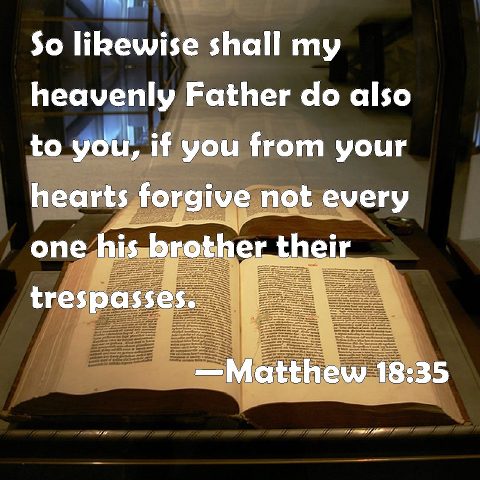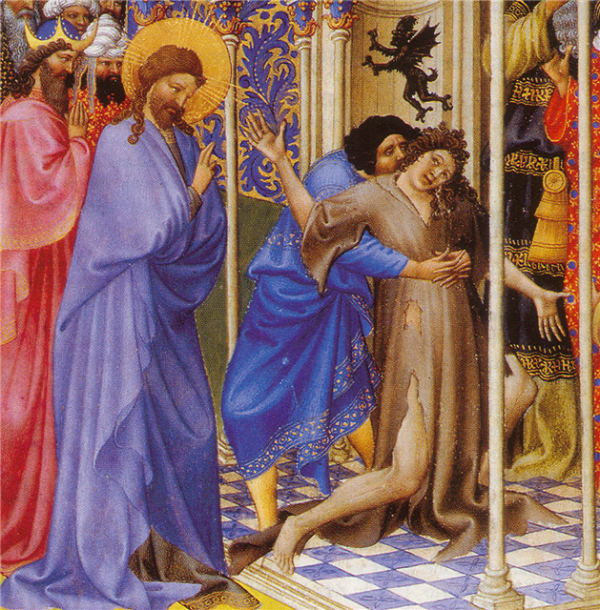GOSPEL READING: Matthew 18:21-35
21 Then Peter came up and said to him, “Lord, how often shall my brother sin against me, and I forgive him? As many as seven times?” 22 Jesus said to him, “I do not say to you seven times, but seventy times seven. 23 “Therefore the kingdom of heaven may be compared to a king who wished to settle accounts with his servants. 24 When he began the reckoning, one was brought to him who owed him ten thousand talents; 25 and as he could not pay, his lord ordered him to be sold, with his wife and children and all that he had, and payment to be made. 26 So the servant fell on his knees, imploring him, `Lord, have patience with me, and I will pay you everything.’ 27 And out of pity for him the lord of that servant released him and forgave him the debt. 28 But that same servant, as he went out, came upon one of his fellow servants who owed him a hundred denarii; and seizing him by the throat he said, `Pay what you owe.’ 29 So his fellow servant fell down and pleaded with him, `Have patience with me, and I will pay you.’ 30 He refused and went and put him in prison till he should pay the debt. 31 When his fellow servants saw what had taken place, they were greatly distressed, and they went and reported to their lord all that had taken place. 32 Then his lord summoned him and said to him, `You wicked servant! I forgave you all that debt because you pleaded with me; 33 and should not you have had mercy on your fellow servant, as I had mercy on you?’ 34 And in anger his lord delivered him to the jailers, till he should pay all his debt. 35 So also my heavenly Father will do to every one of you, if you do not forgive your brother from your heart.”
SCRIPTURE READING: Daniel 3:25,34-43 (Deutero-canonical book)
25 Azariah prayed: “For your name’s sake do not give us up utterly, and do not break your covenant, and do not withdraw your mercy from us, for the sake of Abraham your beloved and for the sake of Isaac your servant and Israel your holy one, to whom you promised to make their descendants as many as the stars of heaven and as the sand on the shore of the sea. For we, O Lord, have become fewer than any nation, and are brought low this day in all the world because of our sins. And at this time there is no prince, or prophet, or leader, no burnt offering, or sacrifice, or oblation, or incense, no place to make an offering before you or to find mercy.Yet with a contrite heart and a humble spirit may we be accepted, as though it were with burnt offerings of rams and bulls, and with tens of thousands of fat lambs; such may our sacrifice be in your sight this day, and may we wholly follow you, for there will be no shame for those who trust in you. And now with all our heart we follow you, we fear you and seek your face. Do not put us to shame, but deal with us in your forbearance and in your abundant mercy. Deliver us in accordance with your marvelous works, and give glory to your name, O Lord!”
Meditation: Who doesn’t have debts they need to pay off! And who wouldn’t be grateful to have someone release them from their debts? But can we really expect mercy and pardon when we owe someone a great deal? When the people of Israel sinned and rebelled against God, God left them to their own devices until they repented and cried out to him for mercy. The Book of Daniel in the Old Testament recounts the story of Daniel and his three young friends, Hananiah, Mishael, and Azariah, who were sent into exile from Jerusalem to Babylon. When the King of Babylon threw Daniel’s three friends into the fiery furnace, they cried out to God to have mercy not only on themselves, but to have mercy upon all his people. “Do not put us to shame, but deal with us in your forbearance and in your abundant mercy” (Daniel 3:19-43).
The prophet Jeremiah reminds us that God’s “mercies never come to an end – they are new every morning” (Lamentations 3:22-23). God gives grace to the humble and he shows mercy to those who turn to him for healing and pardon.
We owe God a debt we could never repay
God’s mercy towards each one of us shows us the way that God wants each one of us to be merciful towards one another. When Peter posed the question of forgiveness and showing mercy to one’s neighbor, he characteristically offered an answer he thought Jesus would be pleased with. Why not forgive your neighbor seven times! How unthinkable for Jesus to counter with the proposition that one must forgive seventy times that. Jesus made it clear that there is no reckonable limit to mercy and pardon. And he drove the lesson home with a parable about two very different kinds of debts. The first man owed an enormous sum of money – millions in our currency. In Jesus’ time this amount was greater than the total revenue of a province – more than it would cost to ransom a king! The man who was forgiven such an incredible debt could not, however bring himself to forgive his neighbor a very small debt which was about one- hundred-thousandth of his own debt. The contrast could not have been greater!
Jesus paid the price in full for our guilt and condemnation
Paul the Apostle tells us that “the wages of sin is death, but the free gift of God is eternal life in Christ Jesus our Lord” (Romans 6:23). There is no way we could repay God the debt we owed him because of our sins and offenses. Only his mercy and pardon could free us from such a debt. There is no offense our neighbor can do to us that can compare with our debt to God! If God has forgiven each of us our own debt, which was very great, we, too must forgive others the debt they owe us.
Jesus ransomed us from slavery to sin and eternal death
Through Jesus’ atoning sacrifice for our sins on the cross, we have been forgiven a debt beyond all reckoning. It cost God his very own Son, the Lord Jesus Christ, to ransom us with the price of his blood. Jesus paid the price for us and won for us pardon for our sins and freedom from slavery to our unruly desires and sinful habits. God in his mercy offers us the grace and help of his Holy Spirit so we can love as he loves, pardon as he pardons, and treat others with the same mercy and kindness which he has shown to us.
True peace with God
God has made his peace with us. Have you made your peace with God? If you believe and accept God’s love and and pardon for you, then you likewise must choose to be merciful towards those who are in debt to you. Are you ready to forgive and to make peace with your neighbor as God has made peace with you?
Lord, make me an instrument of your peace. Where there is hatred let me sow love. Where there is injury let me sow pardon. Where there is doubt let me sow faith. Where there is despair let me give hope. Where there is darkness let me give light. Where there is sadness let me give joy. (Prayer of Saint Francis of Assisi, 1181-1226)
Psalm 25:4-9
4 Make me to know your ways, O LORD; teach me your paths.
5 Lead me in your truth, and teach me, for you are the God of my salvation; for you I wait all the day long.
6 Be mindful of your mercy, O LORD, and of your steadfast love, for they have been from of old.
7 Remember not the sins of my youth, or my transgressions; according to your steadfast love remember me, for your goodness’ sake, O LORD!
8 Good and upright is the LORD; therefore he instructs sinners in the way.
9 He leads the humble in what is right, and teaches the humble his way.
Daily Quote from the Early Church Fathers: A daily remedy for our sins, by Augustine of Hippo, 354-430 A.D.
“Forgive us our debts as we also forgive our debtors. Let us say this sentence with sincerity, because it is an alms in itself. Sins that oppress and bury us cannot be termed trifles! What is more minute than drops of rain? Yet they fill the rivers. What is more minute than grains of wheat? Yet they fill the barns. You note the fact that these sins are rather small, but you do not take note that there are many of them. In any case, God has given us a daily remedy for them.” (excerpt from Sermon 205,1)
Meditations may be freely reprinted for non-commercial use – please cite: copyright © 2022 Servants of the Word, source: dailyscripture.net, author Don Schwager.
Scripture quotations from Common Bible: Revised Standard Version of the Bible, copyright 1973, and Ignatius Edition of the Revised Standard Version of the Bible, copyright 2006, by the Division of Christian Education of the National Council of the Churches of Christ in the United States of America. Used by permission. All rights reserved. Citation references for quotes from the writings of the early church fathers can be found here.
The Daily Scripture Readings and Meditations is in need of on-going development to expand resources and to reach people around the world. If you would like to contribute, you can make an online donation.







